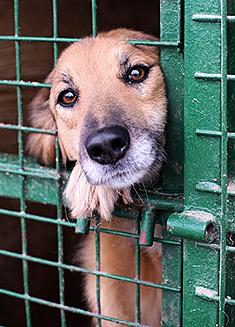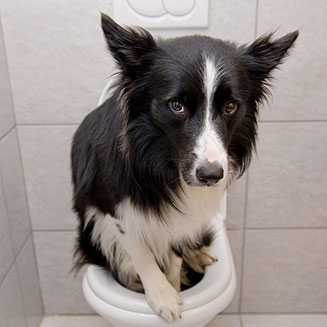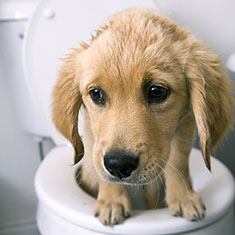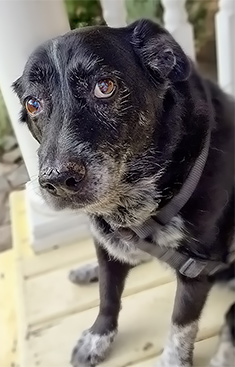Laws Regarding Puppy Mills
Would it surprise you to know that there is no legal definition of a puppy mill? You might think it’s pretty self-explanatory, but lawyers need a specific definition. The ASPCA defines a puppy mill as a “large-scale commercial dog breeding operation where profit is given priority over the well-being of the dogs,” and as we’ve highlighted on the blog lately, there are many red flags that should alert you if you are interviewing a breeder before buying a puppy from him or her.

If you’re buying directly from a breeder, you should look out for those who have more than two or three breeds on the property, or if the puppies and adult dogs are kept in dirty, over-crowded cages you might suspect you are at a puppy mill. However, most puppy mill puppies aren’t sold directly to families. They’re sold to pet stores, who in turn sell them to unsuspecting people who want to have a purebred dog.
You may have seen pictures of puppy mills , and you might wonder why this type of operation is allowed to continue. After all, many of the puppies who come from these mills have numerous genetic diseases and other problems as a result of the conditions of their birth. The answer is that there are huge loopholes in the laws governing puppy mills, and as many as 17 states have no laws at all.
Federal Legislation
In 1966, the Animal Welfare Act was passed to regulate commercial dog breeding. This law described the barest minimum standards of care acceptable for dogs which are being bred to be sold wholesale, to be enforced by the United States Department of Agriculture.
The major loophole in this law is that mills that sell directly to consumers are not bound by it. Because this law was passed way before anyone had heard of the Internet, it didn’t include any provisions for puppy mills that sell on the Web. In addition, many Internet puppies are bred overseas and are not subject to US law.
In 2008, the Farm Bill included an amendment that said puppies couldn’t be imported for the purpose of resale until they have reached the age of at least six months. Although this was a major victory, it still didn’t address the problem of puppies sold directly to consumers after being born in either domestic or foreign puppy mills.
In September, 2008, the Puppy Uniform Protection Statute (PUPS) was introduced in the US House of Representatives, and a similar bill was introduced in the Senate. It would have restricted the sale of puppies from puppy mills, and would have required breeders to provide out-of-cage exercise for each dog every day. Due to the bills being introduced so late in the year, neither of them was passed.
State Laws

One of the major problems in regulating breeders is that the Federal government considers breeders who sell directly to the public to be retailers, meaning that they do not fall under the purview of the federal government and should be regulated by each state. However, many states categorize these very same operations as breeders, meaning that they must be regulated by the Feds. As a result, no one inspects or regulates many of the nation’s puppy mills.
Even when puppy mills are raided due to reports of inhumane treatment, most existing laws are on the books as civil law, meaning that the most that can be done is to sue the owner. No criminal penalties can be applied because the laws governing puppy mills are not criminal laws. In order to get jail time, prosecutors must prove that criminal animal cruelty statutes have been broken, many of which do not address breeding conditions. It’s a real catch 22.
In 2008, Virginia became the first state to pass meaningful legislation to help curb puppy mills. The law limited the number of adult dogs that any commercial breeder could have at one time to 50. Louisiana, Oregon, and Washington State soon followed suit.
As of this writing, 33 states have laws that seek to regulate the commercial breeding of dogs. Many of them dictate only the minimum age a puppy must attain before being sold. Some simply try to define what constitutes a “commercial breeder” or a “dog breeder,” which is just the first small step toward regulating these entities. Some of them are lemon laws, aimed at protecting consumers who bring home a dog who later turns out to have a disease commonly associated with being born in a puppy mill, such as a respiratory infection or genetic defect. Click this link to access an interactive map of state dog breeding laws.

Below is a summary of the bills currently on the legislative agenda in fifteen states.
Delaware
House Bill 95 defines a breeding dog, and prohibits anyone from having more than 25 of them at any one time.
Illinois
House Bill 198 and Senate Bill 53 state that no breeder can keep more than 20 intact dogs over one year of age. House Bill 5771 defines two categories: commercial breeders and dog breeders, establishing standards and licensing requirements for both. Senate Bill 3841 defines three categories, calling them large-scale breeders, dog breeders, and hobby breeders. Licensing requirements and standards are spelled out for commercial breeders and dog breeders.
Iowa
Three bills are currently being considered in Iowa: House Bill 2280, and Senate Bills 2365 and 2233, all proposing standards of care for commercial breeders.
Massachusetts
Senate Bill 774 attacks the problem by prohibiting anyone who has more than 25 intact adult dogs from getting a kennel license. Those who do get a license would be required to adhere to strict exercise requirements and to have their kennels constructed to meet minimum standards.
Minnesota
In Minnesota, House Files 253 and 573, as well as Senate Files 7, 201, and 500 seek to provide definitions for commercial breeders and hobby breeders.
Missouri
Missouri’s House Bill 1921 would apply to all breeders, regardless of how many dogs they own. It introduces standards of care and prohibits anyone from having more than 50 intact dogs over the age of four months at any time.
New Hampshire
The Live Free or Die state has House Bill 1624 on its docket. It would set standards of care for anyone who has more than ten intact dogs over the age of four months. It would also regulate anyone who is involved in the negotiation, buying, selling, or transferring of dogs to an owner within the state. Finally, it limits the number of intact dogs over four months of age anyone can have for breeding purposes to 50.
New Jersey
Assembly Bill 474 defines a breeder and requires that the state SPCA and the Humane Society be involved in creating rules for veterinary care.
New York
No fewer than seven bills related to dog breeders are being considered in The Empire State. Assembly Bills 5507 and 6797 appear to be very vague, while Assembly Bill 7983 and Senate Bills 518, 4690, and 4961 would regulate the number of dogs which can be owned or sold by any one breeding operation.
North Carolina
House and Senate Bills 460 define commercial breeders and introduce new standards of care and penalties for these breeders.
Ohio
In Ohio, House Bill 124 and Senate Bill 95 define “regulated dog breeding kennels”.
Oklahoma
In Oklahoma, House Bill 1332 creates a quality assurance license for breeders, based on the number of dogs they sell, give away, or transfer in any calendar year.
South Dakota
The good folks in Pierre are considering House Bill 1146, which establishes a definition of a commercial breeder and prohibits ownership of more than 50 intact dogs over the age of one year. It also allows the investigation of commercial breeders by humane society officials.
Washington
House Bill 1936 in Washington State establishes rules for anyone who owns ten or more intact dogs and prohibits any one person from owning more than 25 intact dogs over the age of four months.
Wisconsin
Senate Bills 110 and 208 define commercial breeders and dog breeders. Only SB 208 sets licensing requirements and standards of care.
Many states also have other dog-related legislation such as spay/neuter and tethering laws under consideration.
Get involved
I know, you already went to the polls to vote, but you can still be involved in the legislative process. Use this link to find your state legislators’ addresses and drop them a line to ask them to support dog-friendly legislation. Encourage them to support at least one of the proposed laws in your state, or to introduce a bill that would provide meaningful reform to the puppy mill industry.
In many of the states with more than one proposed statute, it is a very real possibility that none of the laws will be passed because legislators will continue to bicker over which one is best. Encourage the legislators who represent your location to get over party politics and do the right thing.
Doggies Den: Latest Articles
 Homemade Thanksgiving Treats for Your Dog
Homemade Thanksgiving Treats for Your Dog
NUTRITION We all want to include our dogs in our holiday celebrations, but hopefully, you're aware that sharing table scraps with your dog isn't always the best idea.
 Keeping Your Dog Safe during the Summer Months
Keeping Your Dog Safe during the Summer Months
HEALTH Summer is coming on fast, so it’s time to plan how you will keep your dog safe and healthy through the lazy, carefree, warm days.
 Vaccination Time Again-Keeping Your Puppy Healthy
Vaccination Time Again-Keeping Your Puppy Healthy
DOG HEALTH So you have your new puppy picked out. There are quite a few shots, treatments and examinations that will keep the newest member of your family healthy.
 Canine Thanksgiving Feast
Canine Thanksgiving Feast
NUTRITION With the wide variety of food at Thanksgiving dinner, chances are you'll want to give your dog something special, too. If you're contemplating what to feed your dog for the holiday, here is a guide to a great Canine Thanksgiving Feast.
 Dog Walking Tips Every Owner Should Know
Dog Walking Tips Every Owner Should Know
DOG FUN Walking your dog is not only crucial to keeping him healthy and happy, it strengthens the bond between your canine friend and his caregiver. There are a lot of obstacles out there. Don’t forget these simple tips to keep your walk fun and safe in the outside world.
 The Benefits of Physiotherapy for your Dog
The Benefits of Physiotherapy for your Dog
HEALTH The same techniques that physiotherapists use to treat a variety of injuries and conditions in humans have been adapted to suit animals with great success. Family pets, show dogs, and working dogs can all benefit greatly from physiotherapy. Dogs whose activities involve a lot of agility are especially susceptible to the types of problems that physiotherapy can address.
 The Decision- Adding a Dog to Your Family
The Decision- Adding a Dog to Your Family
FIRST TIME OWNERSBringing a dog into your family is a decision where many people don’t realize it’s magnitude until after they have the dog. There are a number of things that you need to research before you decide to purchase a dog, and it starts right in your own home.
 Bringing Your Dog Into Your New Baby's Life
Bringing Your Dog Into Your New Baby's Life
HEALTH Many believe that a dog and a new baby cannot happily coexist, so therefore the dog has to go. This is not necessarily the case.  A new baby does not mean you have to abandon your dog.

Doggies Den:
Most Popular Articles

Dog Pregnancy Symptoms
HEALTHIf you suspect your dog might be pregnant, check out part one in this series on pregnant dogs, where we cover pregnant dog symptoms.

Dog Birth
HEALTHIn the third article of our dog pregnancy series, we look at the wonderful, but messy, process of bringing newborn puppies into the world.

Indoor Dog Potties
DOG PRODUCTSIt's been a long day at work. You were so busy, you didn't even take time to eat a sandwich, let alone run home to let your dog out. You're on your way home, knowing the poor dog is crossing his or her legs by now, when your car breaks down, delaying you even further. Can't somebody make this easier?

Your Dog’s Digestive System
PHYSIOLOGYEver wonder why your dog eats so fast? Or why he eats gross things? Or why he gets sick to his stomach? Or why his waste stinks so bad? Some of these things are normal, some are not.

Canine Respiratory System
BREATHINGThe basic function of your dog's respiratory system is to bring oxygen in to and remove carbon dioxide from the body. Knowing the symptoms of respiratory diseases can help you help your stay healthy.

Shelter Dog Adoption Tips for Success
ADOPTION Are you intimidated by the prospect of "rescuing" a dog from a shelter? One reason that you may be wary of adopting a dog from a shelter is not knowing how to choose. Adopting a dog from a shelter can be a rewarding process, if you're prepared to do a reasonable amount of research.

Canine Urinary Tract Infections
SYMPTOMS AND TREATMENTDoes your dog seem to be having trouble relieving his or her bladder? Learn how to recognize the signs of urinary tract infections and how to treat them before they spread.

What to do for Dog Diarrhea
SYMPTOMS AND REMEDIESIf you have dogs in your house for any length of time, you have likely experienced at least one bout of dog diarrhea. Beyond the pain in the tuckus involved in cleaning up the mess, you should know what causes diarrhea, and when it's important to see the vet.

What to do for a Dog Bite
DOG BEHAVIOR Getting bitten by a dog can be scary, and you may be tempted to run around in circles for a while, trying to figure out what to do. Here's our guide to help you manage the situation.

Top Ten Tips for Living with a Senior Dog
DOG HEALTH Bringing home a new puppy is so exciting, but it doesn’t take all that long for your exuberant puppy to grow into a senior dog who may have special needs. Here are the doggies.com top ten tips for taking care of your companion who has been with you through so much.
